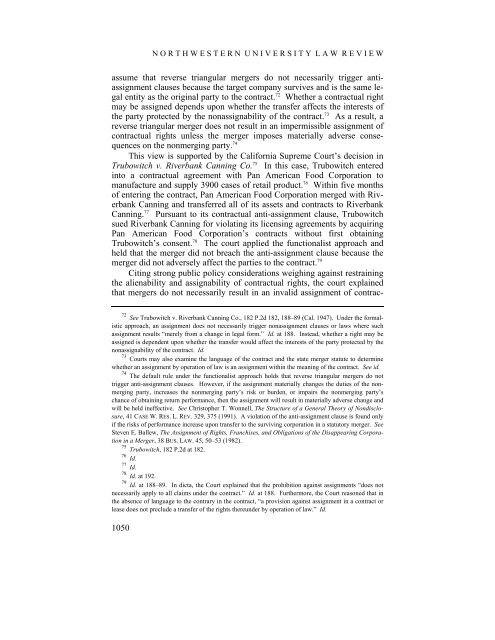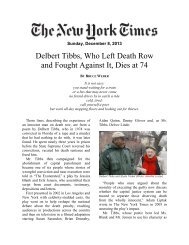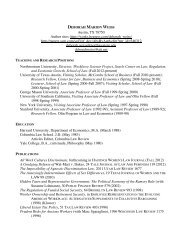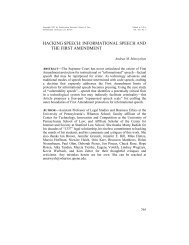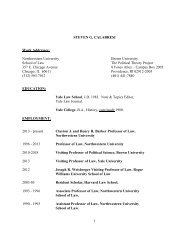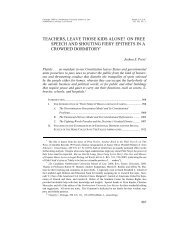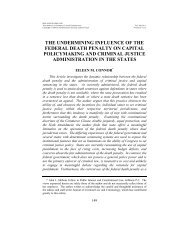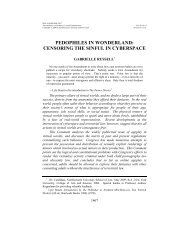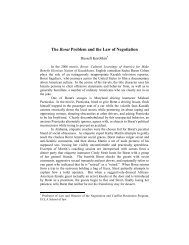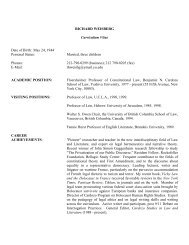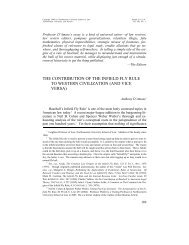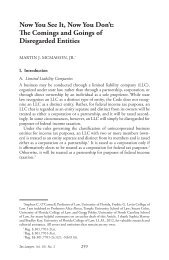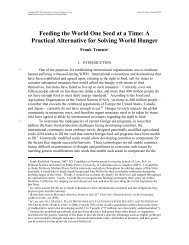The Reverse Triangular Merger Loophole and Enforcing Anti
The Reverse Triangular Merger Loophole and Enforcing Anti
The Reverse Triangular Merger Loophole and Enforcing Anti
Create successful ePaper yourself
Turn your PDF publications into a flip-book with our unique Google optimized e-Paper software.
1050<br />
N O R T H W E S T E R N U N I V E R S I T Y L A W R E V I E W<br />
assume that reverse triangular mergers do not necessarily trigger antiassignment<br />
clauses because the target company survives <strong>and</strong> is the same legal<br />
entity as the original party to the contract. 72 Whether a contractual right<br />
may be assigned depends upon whether the transfer affects the interests of<br />
the party protected by the nonassignability of the contract. 73 As a result, a<br />
reverse triangular merger does not result in an impermissible assignment of<br />
contractual rights unless the merger imposes materially adverse consequences<br />
on the nonmerging party. 74<br />
This view is supported by the California Supreme Court’s decision in<br />
Trubowitch v. Riverbank Canning Co. 75 In this case, Trubowitch entered<br />
into a contractual agreement with Pan American Food Corporation to<br />
manufacture <strong>and</strong> supply 3900 cases of retail product. 76 Within five months<br />
of entering the contract, Pan American Food Corporation merged with Riverbank<br />
Canning <strong>and</strong> transferred all of its assets <strong>and</strong> contracts to Riverbank<br />
Canning. 77 Pursuant to its contractual anti-assignment clause, Trubowitch<br />
sued Riverbank Canning for violating its licensing agreements by acquiring<br />
Pan American Food Corporation’s contracts without first obtaining<br />
Trubowitch’s consent. 78 <strong>The</strong> court applied the functionalist approach <strong>and</strong><br />
held that the merger did not breach the anti-assignment clause because the<br />
merger did not adversely affect the parties to the contract. 79<br />
Citing strong public policy considerations weighing against restraining<br />
the alienability <strong>and</strong> assignability of contractual rights, the court explained<br />
that mergers do not necessarily result in an invalid assignment of contrac-<br />
72<br />
See Trubowitch v. Riverbank Canning Co., 182 P.2d 182, 188–89 (Cal. 1947). Under the formalistic<br />
approach, an assignment does not necessarily trigger nonassignment clauses or laws where such<br />
assignment results “merely from a change in legal form.” Id. at 188. Instead, whether a right may be<br />
assigned is dependent upon whether the transfer would affect the interests of the party protected by the<br />
nonassignability of the contract. Id.<br />
73<br />
Courts may also examine the language of the contract <strong>and</strong> the state merger statute to determine<br />
whether an assignment by operation of law is an assignment within the meaning of the contract. See id.<br />
74<br />
<strong>The</strong> default rule under the functionalist approach holds that reverse triangular mergers do not<br />
trigger anti-assignment clauses. However, if the assignment materially changes the duties of the nonmerging<br />
party, increases the nonmerging party’s risk or burden, or impairs the nonmerging party’s<br />
chance of obtaining return performance, then the assignment will result in materially adverse change <strong>and</strong><br />
will be held ineffective. See Christopher T. Wonnell, <strong>The</strong> Structure of a General <strong>The</strong>ory of Nondisclosure,<br />
41 CASE W. RES. L. REV. 329, 375 (1991). A violation of the anti-assignment clause is found only<br />
if the risks of performance increase upon transfer to the surviving corporation in a statutory merger. See<br />
Steven E. Ballew, <strong>The</strong> Assignment of Rights, Franchises, <strong>and</strong> Obligations of the Disappearing Corporation<br />
in a <strong>Merger</strong>, 38 BUS. LAW. 45, 50–53 (1982).<br />
75<br />
Trubowitch, 182 P.2d at 182.<br />
76<br />
Id.<br />
77<br />
Id.<br />
78<br />
Id. at 192.<br />
79<br />
Id. at 188–89. In dicta, the Court explained that the prohibition against assignments “does not<br />
necessarily apply to all claims under the contract.” Id. at 188. Furthermore, the Court reasoned that in<br />
the absence of language to the contrary in the contract, “a provision against assignment in a contract or<br />
lease does not preclude a transfer of the rights thereunder by operation of law.” Id.


